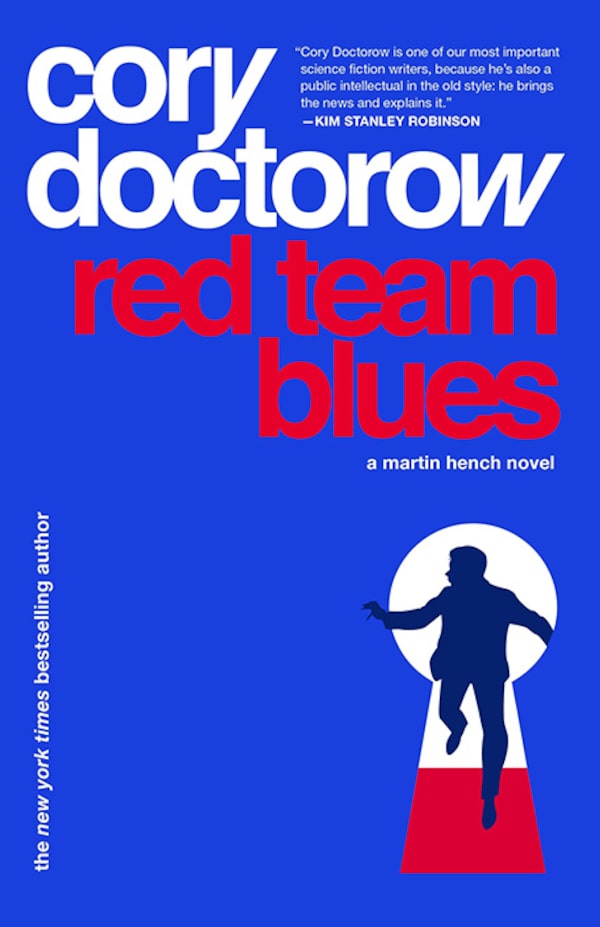Author Cory Doctorow.
- Title: Red Team Blues
- Author: Cory Doctorow
- Genre: Thriller
- Publisher: Tor Publishing Group
- Pages: 224
The enduring brilliance of the noir tradition is not just that it has remained relevant for the better part of a century, but that it seems increasingly relevant. Noir travels well. Our institutions, attitudes and technologies soak up moral ambiguity, nihilism, anxiety, pessimism like a sponge. And they soak them up because we soak them up.

Red Team Blues, by Cory Doctorow.Handout
In the film The Lion in Winter, King Henry II confronts King Philip of France in a tete-a-tete over the future of chunks of Europe. “We are the world in small,” says Henry. “A nation is a human thing. It does what we do, for our reasons.” If there’s a better way to describe nations, I’ve never heard it. But what can be said about nations can be said about plenty of other things, too – not the least of which is technologies. Indeed, today, it might be said about technologies with the same concerns over moral ambiguity, nihilism, anxiety, pessimism and violence with which we speak of nations. The same noir-laden tension and fear and uncertainty about what the future holds. The same sneaking worry that things won’t look so good up and around the bend.
In Red Team Blues, Cory Doctorow introduces the world to Martin Hench, a 67-year-old forensic accountant and tech expert who drives around in a fancy tour bus called the Unsalted Hash. We meet him just as he’s pulled into a thrilling plot of plots in which lives and unbelievable amounts of money – indeed, the fate of the global economy itself – hang in the balance. Against a backdrop of crypto-grifts, digital and analogue surveillance, and corporate malfeasance, Hench tries to right the wrongs of others while doing decent by others and himself. The catalogue copy describes the book as a “grabby next-Tuesday thriller about cryptocurrency shenanigans that will awaken you to how the world really works.” In this instance, the marketing copy doesn’t lie, though it might have added the word “noir,” because this book is a noir mystery. Either way, it is outstanding. The pages seem to turn themselves.
Thirty nine fiction and non-fiction books to read this spring
Hench is redolent of Raymond Chandler’s original private-eye Philip Marlowe. Indeed, he’s a Marlowe for the information age. The occasional line in Red Team Blues could appear in one of Chandler’s novels. “Everyone’s concerned about my safety today,” quips Hench, talking to a federal agent who is, perhaps, not all that concerned about Hench as he is other things. The ironic asides floated in passing as part of punchy dialogue make up a bridge that links this contemporary novel to a great literary (and pulp) tradition. The dialogue reads true and helps keep a sometimes-tech-heavy book readable and well-paced.
The novel is openly didactic in a way the noir tradition isn’t, giving it a weight of its own that is welcome to a reader who expects protagonists who live in the world to have opinions about that world – and authors, too. Doctorow is not subtle about where he stands on the cryptocurrency grift, on corporate practices such as factoring (“No dirtier than any monopoly scam”), on industry power (“They have the gold, they make the rules”), and plenty of other concerns on which he takes a progressive stance, from homelessness and tax avoidance to climate change and the drug poisoning crisis. With the novel set in California, in Silicon Valley and beyond, the absence of a take on these issues would have been conspicuous.
‘You’ve gotta read this’: The books Globe staff are loving right now
Underlying the novel is a Manichean duality between the red team and the blue team – the attackers and the defenders, who both need and help constitute one another, like Sam Sheepdog and Ralph Wolf. Here the noir link is strained a tad, but ultimately kept together as the lines between the two sides blur. Hench finds himself meeting and needing help from people after years of working at cross purposes. And thus the noir tradition is kept alive with everyone bound up in a giant machine that we have all created but none of us, not even the powerful, really seem to be able to understand, let alone control.
In the acknowledgments at the end of the novel, Doctorow thanks “every crypto grifter for giving me such fertile soil to plow.” If ever there was a time for a novel to recall the noir tradition while opening it up to moral judgment with a side of technological elucidation and commentary, it’s now. And Doctorow is just the person you want doing it. Lucky for us, it sounds like Hench will return – which is fitting, because corporate exploitation and tech grifts aren’t going anywhere any time soon.